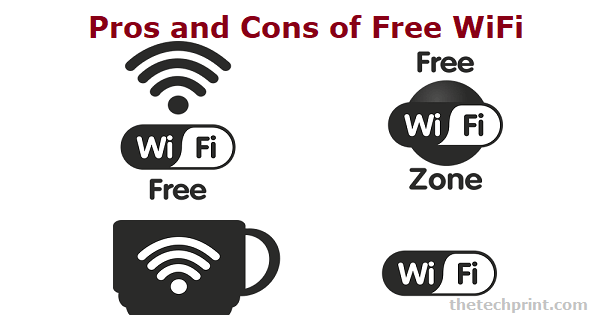When it comes to accessing free internet, it's almost hard to resist for everyone. After all, what could be better than surfing the internet for free? Well, as it turns out, there are a lot of pros and cons of free WiFi. You can find free or public WiFi at airports, train stations, libraries, and college campuses. So before you hunt for those open networks, make sure you know what you're getting yourself into.
It's best to connect to free public WiFi when you travel and need internet services. The following are some pros of free WiFi.
One of the most obvious pros of free WiFi is that it gives you access to the internet. Free WiFi can be a lifesaver if you're in a place with no paid WiFi available.
Public WiFi also allows you to connect with friends and family members who may be far away. Social media and other online tools make it easy to keep in touch with loved ones no matter where they are in the world.
When you're connected to free WiFi, you don't have to worry about using up your data allowance. This can be a great way to save money if you have a limited data plan.
Free WiFi can be a godsend if you need to get some work done but don't have access to a paid WiFi connection. You may not have the same speeds or reliability as you would with a paid connection, but it's better than nothing.
When you’re out of cellular data, public WiFi can be extremely handy in the event of an emergency. If you need to get in touch with someone or access important information, being able to connect to the internet for free can be a lifesaver.
Although there are many pros of free WiFi, there are also some potential drawbacks that you should be aware of. The following are some cons of free WiFi.
One of the biggest concerns with free WiFi is security and privacy. When you connect to a public network, you're essentially opening yourself up to hackers and other malicious individuals. Your personal information could be at risk if you're not careful.
Another downside of free WiFi is that the speeds are often much slower than paid connections. This can be frustrating if you're trying to do something that requires a fast connection, such as streaming video or downloading files.
Free WiFi is not always available when and where you need it. If you're in a rural area or somewhere that doesn't have many public hotspots, you may not be able to connect to the internet.
Many public hotspots have time limits, which means you may only be able to use them for a certain amount of time before being disconnected. This can be frustrating if you're in the middle of something and need to continue using the internet.
Some public hotspots have data limits, which means you may only be able to use a certain amount of data before being cut off. This can be problematic if you're trying to do something that requires a lot of data, such as streaming video or downloading files. There can be further cons of Free WiFi when you have something important to download and your access to the network is suddenly restricted.
There are many places where you can find free WiFi. Some of the most common places include:
Airports: Many airports offer free WiFi for passengers. This can be a great way to stay connected while traveling.
Libraries: Most libraries offer free WiFi for patrons. This is a great resource if you need to get some work done or access the internet for research purposes.
Hotels: Many hotels offer free WiFi for guests. This can be a convenient way to stay connected while on vacation or business travel.
Restaurants and cafes: Many restaurants offer customers free WiFi. This can be a great way to stay connected while enjoying a meal or cup of coffee.
Public parks: Many public parks offer free WiFi in designated areas. This can be a great way to stay connected while enjoying the outdoors.
WiFi is a convenient way to get online without searching for a public hotspot, but it’s not always as secure as we would like. Before you start using free WiFi, it’s important to be aware of the pros and cons to make an informed decision about whether or not it’s right for you.

The greatest risk to Wi-Fi security is the hacker's ability to sit between you and the connection point. As a result, instead of speaking directly with the hotspot, you're providing your information to the intruder, who then transmits it.
Wi-Fi is both free and open, allowing you to save time and effort. Passengers utilize their phones on the bus to check Facebook and Instagram. As a result, in a major city, a simple Wi-Fi location might attract visitors and stimulate word of mouth.
An encryption-free connection on a public Wi-Fi network allows intruders to keep track of all file sharing and traffic transmitted between the user and server. An intelligent attacker may simply monitor network users who connect to the router of an unsecured network and deliver malicious JavaScript to their computers.
One of the hazards of using a public Wi-Fi network is that data transmitted over this open connection is frequently unencrypted and unsecured, leaving you exposed to a man-in-the-middle (MITM) attack.
It is debatable, according to security experts. Encryption has made internet surfing more secure but hasn't eliminated the danger. Because of the threat of being hacked while using public Wi-Fi networks, security professionals have long advised individuals to avoid them.
When you connect to a VPN, your internet traffic becomes encrypted. Thus no one can spy on it via public Wi-Fi. Even though you're not using a secure Wi-Fi connection, the VPN will safeguard your connection everywhere, so you won't have to worry about external security anymore.